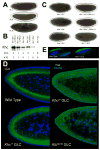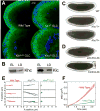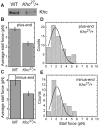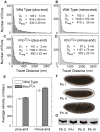Consequences of motor copy number on the intracellular transport of kinesin-1-driven lipid droplets
- PMID: 19070579
- PMCID: PMC2768369
- DOI: 10.1016/j.cell.2008.10.021
Consequences of motor copy number on the intracellular transport of kinesin-1-driven lipid droplets
Abstract
The microtubule motor kinesin-1 plays central roles in intracellular transport. It has been widely assumed that many cellular cargos are moved by multiple kinesins and that cargos with more motors move faster and for longer distances; concrete evidence, however, is sparse. Here we rigorously test these notions using lipid droplets in Drosophila embryos. We first employ antibody inhibition, genetics, biochemistry, and particle tracking to demonstrate that kinesin-1 mediates plus-end droplet motion. We then measure how variation in kinesin-1 expression affects the forces driving individual droplets and estimate the number of kinesins actively engaged per droplet. Unlike in vitro, increased motor number results in neither longer travel distances nor higher velocities. Our data suggest that cargos in vivo can simultaneously engage multiple kinesins and that transport properties are largely unaffected by variation in motor number. Apparently, higher-order regulatory mechanisms rather than motor number per se dominate cargo transport in vivo.
Figures





Comment in
-
Counting motors by force.Cell. 2008 Dec 12;135(6):1000-1. doi: 10.1016/j.cell.2008.11.021. Cell. 2008. PMID: 19070567
References
Publication types
MeSH terms
Substances
Grants and funding
LinkOut - more resources
Full Text Sources
Other Literature Sources
Molecular Biology Databases

